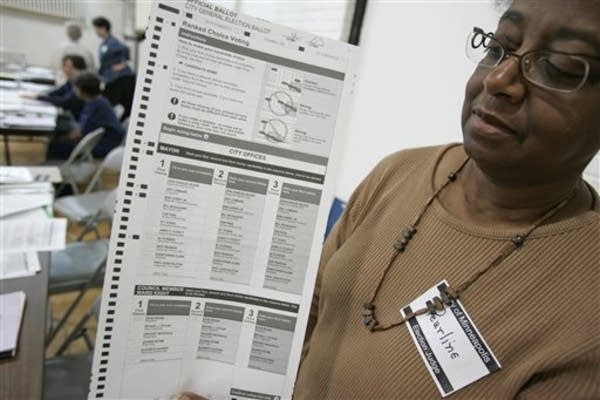Minneapolis' mayoral race puts test to ranked-choice voting system
Go Deeper.
Create an account or log in to save stories.
Like this?
Thanks for liking this story! We have added it to a list of your favorite stories.

Voters will have several choices to consider in this year's mayoral election.
So far, seven people have declared they are running for mayor in the most hotly contested race Minneapolis has seen in decades. Just as it did four years ago, Minneapolis will use ranked-choice voting to decide the winner. The November election is expected to draw far more voters and put the system to the test.
Election judge Nasra Noor showed a voter how to use a ranked-choice ballot in 2009. It was the city's first election using the new system, which is also called instant-runoff voting. It allows voters to choose up to three candidates for each office and rank them first, second and third.
But not many people voted. Fewer than 46,000 ballots were cast that year. It was the lowest general election turnout the city had seen in decades -- about half of what is normal for Minneapolis municipal elections.
Turn Up Your Support
MPR News helps you turn down the noise and build shared understanding. Turn up your support for this public resource and keep trusted journalism accessible to all.
FairVote Minnesota executive director Jeanne Massey expects far more people to participate this year, because of the wide-open mayoral race.
"It's probably one of the biggest races ranked choice voting has seen in this country in terms of a competitive race," Massey said.
Massey said this kind of race — with at least half a dozen credible candidates — will showcase the advantages of ranked-choice voting. There will be no primary to winnow the field, so voters will have more options. Massey said candidates will build broader coalitions because they will likely need first, second and third-choice votes to win.
"It means that you're deciding the candidate who's going to lead you into the future, especially in an important mayor's race, with the most votes," Massey said.
But where Massey sees the system as a way to empower voters, critics argue it leads to confusion and disenfranchisement.
Devin Rice is a member of the Minneapolis Charter Commission and would like to see ranked-choice voting repealed.
"The Voting Rights Act of 1965 ended poll taxes and literacy tests," Rice said. "In some ways, I will argue that this ranked-choice voting ballot may be more complicated for some than a literacy test."
Polling shows only 5 percent of Minneapolis voters found ranked-choice voting difficult last time around.
But Rice said the ballots, themselves, indicate many voters failed to follow the directions — especially in parts of the city with lower incomes and larger minority populations. In north Minneapolis, ward 5, more than 14 percent of ballots contained voter errors.
In most cases, the city was still able to count those votes. But Rice argues the errors mean the votes counted less, because voters may have lost the chance to have their second or third choice registered.
He worries this year, even more people will be confused.
"You could conceivably have 35,000 - 40,000 voters that this will be their first ranked-choice voting election," Rice said. "And I think you will have significantly higher turnout amongst the minority and low-income areas of the city."
Higher turnout could also slow down the vote counting. Even in 2009 with its low turnout, Minneapolis took more than two weeks to count ballots by hand, because its machines were not capable of tabulating a ranked-choice election.
Those machines are scheduled to be replaced this year, but it remains uncertain whether they will be approved to handle ranked choice ballots in time.
The necessary software needs approval from federal and state officials, before the county can buy it for the city, Minneapolis City Clerk Casey Carl said.
"When you have that many interests it does take a little bit longer to put in place a system that's going to meet everyone's expectations at all levels of government," Carl said.
Ranked-choice voting advocates want to get the voting machines in place, and are raising money to help educate voters. They know other cities considering the alternative voting system will be watching what happens this year in Minneapolis.




